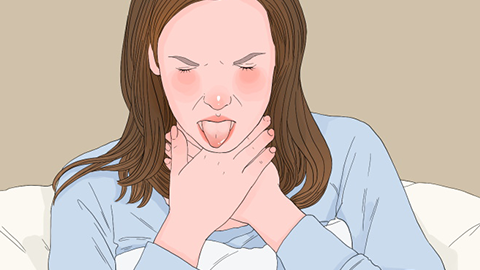What does it mean when a baby has a thick white coating on the tongue?
Generally, thick white tongue coating in infants may be caused by residual milk stains after feeding, insufficient saliva secretion, food accumulation, oral inflammation, or thrush. If there is any discomfort, it is recommended to seek medical attention promptly. The specific causes are analyzed as follows:
1. Residual milk stains after feeding
During feeding, milk may adhere to the surface of the infant's tongue. Due to limited oral activity in infants, milk residue can remain and form a thick white coating on the tongue, which is a normal physiological phenomenon. After each feeding, parents can give the infant a small amount of warm water to help rinse away milk residue on the tongue. Alternatively, parents may use a clean cotton swab dipped in warm water to gently wipe the infant's tongue, being careful to perform the action gently to avoid damaging the oral mucosa.
2. Insufficient saliva secretion
Infants' salivary glands are not yet fully developed, resulting in limited saliva production. This prevents effective rinsing of secretions and milk residue from the tongue, leading to a thick white coating. As the infant grows and the salivary glands develop, this condition will naturally improve. In daily care, the infant's water intake can be moderately increased to stimulate saliva secretion. Parents can also gently massage the infant's gums with a clean finger when the infant is awake to promote saliva production.

3. Food accumulation
Infants have relatively weak digestive function. If an infant consumes excessive milk or feeds too frequently, food accumulation may occur. When food remains in the gastrointestinal tract for too long, it can cause a thick white tongue coating, possibly accompanied by symptoms such as bad breath and abdominal distension. Feeding times and milk volume should be reasonably managed to avoid overfeeding. After feeding, hold the infant upright and gently pat the back to promote digestion. If symptoms of food accumulation are evident, medications such as Xiaoshi Oral Liquid, Bacillus subtilis live capsules, or Qixing Tea Granules for children may be used under a doctor's guidance to improve digestion.
4. Oral inflammation
When the oral cavity is infected by bacteria and inflammation occurs, the oral mucosa will show an inflammatory response with increased secretions, leading to a thick white tongue coating. Symptoms may include redness and swelling of the oral mucosa and infant irritability. Treatment should involve medications under a doctor's guidance, such as Compound Chlorhexidine Gargle, Cefaclor Dry Suspension, or Pediatric Yankian Granules, to control the inflammation. It is also important to maintain the infant's oral hygiene by cleaning the mouth promptly after feeding. Bottles and nipples should be regularly disinfected.
5. Thrush
Thrush is caused by Candida albicans infection, which forms white patches on the tongue and oral mucosa that are difficult to remove. Forceful removal may lead to redness, swelling, and bleeding at the affected site, and the infant may refuse to feed due to pain. Antifungal medications such as Nystatin tablets, Fluconazole and Sodium Chloride Injection, or Sodium Bicarbonate Injection should be administered under a doctor's guidance. Parents should wash their hands thoroughly before handling the infant, and the infant's utensils and toys should be regularly sterilized by high-temperature methods to prevent cross-infection.
In daily life, attention should be paid to the infant's dietary hygiene, including cleaning the nipple or sterilizing the bottle before feeding, adjusting the milk volume according to the infant's digestive capacity, and closely monitoring changes in the infant's tongue coating.







